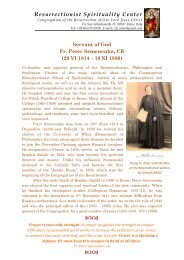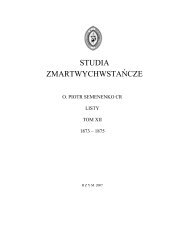- Page 1 and 2:
RESURRECTION STUDIESBOGDAN JANSKIL
- Page 3 and 4:
IINTRODUCTION TO THE LETTERSThe fou
- Page 5 and 6:
IIIdeeply interested in the attitud
- Page 7 and 8:
VBy the end of 1834, Janski had ret
- Page 9 and 10:
VIIAfter sending the first two cler
- Page 11 and 12:
IXnor was he allowed to return to s
- Page 13 and 14:
XIHere the first works of Fr. Semen
- Page 15 and 16:
XIIIreview my thoughts and actions
- Page 17 and 18:
XVwith all my strength for its main
- Page 19 and 20:
XVIIChristian perfection in their a
- Page 21 and 22:
XIXQuite often the letters of Jansk
- Page 23 and 24:
THE LETTERSOF BOGDAN JANSKI(1828-18
- Page 25 and 26:
2Rough Sketches of Letters to Alex[
- Page 27 and 28:
4not, then obviously you will remai
- Page 29 and 30:
6Letter Nr. 2Berlin, November 6, 18
- Page 31 and 32:
8Letter Nr. 3Paris, December 25, 18
- Page 33 and 34:
10man’s desire to let everyone kn
- Page 35 and 36:
12or exaggerating. Some of the smal
- Page 37 and 38:
14while wishing to do someone a fav
- Page 39 and 40:
16simply further proof that freshne
- Page 41 and 42:
18scenery stretching out before him
- Page 43 and 44:
20great pleasure. I would be truly
- Page 45 and 46: 22and reading. Continue knitting so
- Page 47 and 48: 24was there to be angry about? If o
- Page 49 and 50: 26unconcealed desire to enjoy the p
- Page 51 and 52: 28imprudence of your elders. What,
- Page 53 and 54: 30exchanges. If you feel that these
- Page 55 and 56: 32need to be very careful, guarding
- Page 57 and 58: 34in the villages. Very well, then,
- Page 59 and 60: 36Letter Nr. 5Paris, July 20, 1829D
- Page 61 and 62: 38No, dearest Alexandra. Since you
- Page 63 and 64: 40Dear Alexandra, in your last lett
- Page 65 and 66: 42Dearest Alexandra, I ask this of
- Page 67 and 68: 44the Secretary of the Board of the
- Page 69 and 70: 46Letter Nr. 7London, September 9,
- Page 71 and 72: 48anything about the transfer of fu
- Page 73 and 74: 50Letter Nr. 8London, November 22,
- Page 75 and 76: 52takes about 14 or 15 days for a l
- Page 77 and 78: 54Letter Nr. 9Paris, March 2, 1831D
- Page 79 and 80: 56If I say it is good for me, you m
- Page 81 and 82: 58Rough drafts of letters to Profes
- Page 83 and 84: 60of the Law and of present needs i
- Page 85 and 86: 62Board made any definite statement
- Page 87 and 88: 64will remember him. Here in Paris
- Page 89 and 90: 66continues to offer his course in
- Page 91: 68I welcome the news concerning the
- Page 94 and 95: 71Bogdan Jański
- Page 98 and 99: 75Letter Nr. 16Paris, October 23, 1
- Page 100 and 101: 77Your Honor's character, and so in
- Page 102 and 103: 79Letter Nr. 17Paris, October 25, 1
- Page 104 and 105: 81P.S. Messrs Szyrma 95 , Mochnacki
- Page 106 and 107: 83izing and complementing the econo
- Page 108 and 109: 85My correspondence with the Educat
- Page 110 and 111: 87Letter Nr. 19Paris, June 7, 1831
- Page 112 and 113: 89Letter Nr. 20Paris, June 7, 1837P
- Page 114 and 115: 911. The date of this letter is fou
- Page 116 and 117: 93Christmas. I would urge him to go
- Page 118 and 119: 8. A Warsaw periodical, which he pl
- Page 120 and 121: 97other universities in Warsaw. He
- Page 122 and 123: 99Dear Stephen, how could you leave
- Page 124 and 125: 1016. Bogdan allows himself to be c
- Page 126 and 127: 103convenience: write the unvarnish
- Page 128 and 129: 105Letter Nr. 25Paris, September 29
- Page 130 and 131: 107Therefore, you need have no scru
- Page 132 and 133: 109Stanislaus Łępicki /Łempicki/
- Page 134 and 135: 111Letter Nr. 27Paris, June 7, 1837
- Page 136 and 137: 113Letter Nr. 28Paris, June 28, 183
- Page 138 and 139: 115most universally valid law of li
- Page 140 and 141: 117Letter Nr. 29Paris, October 16,
- Page 142 and 143: 119The justification for my reasoni
- Page 144 and 145: 121John Aloysius Radomiński. If it
- Page 146 and 147:
123The rough draft of a letter to J
- Page 148 and 149:
125more interesting places in Berli
- Page 150 and 151:
1272. "Sic facta tulerunt."3. Bogda
- Page 152 and 153:
129Jański lived with him in Warsaw
- Page 154 and 155:
1311. A considerably older cousin w
- Page 156 and 157:
133Letter Nr. 33Paris, December 23,
- Page 158 and 159:
135Letter Nr. 34Paris, January, 182
- Page 160 and 161:
137minded enthusiasm and dignified
- Page 162 and 163:
139Letter Nr. 35Paris, May 25, 1829
- Page 164 and 165:
141Institute? 108 Therefore, be a l
- Page 166 and 167:
143my previous two letters were dir
- Page 168 and 169:
145Letter Nr. 37.Paris, May, 1833De
- Page 170 and 171:
147the bill from the bookstore. I h
- Page 172 and 173:
149Letter Nr. 40Paris, June 2, 1836
- Page 174 and 175:
151Dear Michael, take this request
- Page 176 and 177:
153Rough-drafts of letter to Mrs. S
- Page 178 and 179:
155Letter Nr. 43Paris, February 10,
- Page 180 and 181:
157Letter Nr. 44Paris, May 20, 1831
- Page 182 and 183:
159Letter Nr. 45La Grande Trappe, J
- Page 184 and 185:
161her, and to exert every effort t
- Page 186 and 187:
163separation 147 /such a situation
- Page 188 and 189:
165the Lord for my intention. Again
- Page 190 and 191:
167him, I met him on the street. He
- Page 192 and 193:
169Letter Nr. 47Paris, July 15, 182
- Page 194 and 195:
171of colleague Barciński that is
- Page 196 and 197:
173Letter Nr. 49Paris, July 12, 183
- Page 198 and 199:
175Letter Nr. 50Paris, August 20, 1
- Page 200 and 201:
177Mr.Chevieuil; 171 next, for Mr.
- Page 202 and 203:
179Letter Nr. 51Paris, February 9,
- Page 204 and 205:
181Letter Nr. 52Paris, May, 1831Dea
- Page 206 and 207:
183
- Page 208 and 209:
185
- Page 210 and 211:
187Letter Nr. 55Paris, June 9, 1832
- Page 212 and 213:
189Rough-draft of a letter to H. Ja
- Page 214 and 215:
191I am not sorry I did it. In fact
- Page 216 and 217:
193Letter Nr. 57Paris, February 27,
- Page 218 and 219:
195is not enough to keep me alive i
- Page 220 and 221:
197March 11 th at the latest. In an
- Page 222 and 223:
199
- Page 224 and 225:
201or 45 and 14/. Each bottle costs
- Page 226 and 227:
emained in France permanently. He e
- Page 228 and 229:
205Letter Nr. 1[To C.P. Cooper /?]L
- Page 230 and 231:
207Letter Nr. 3[To Talabot /?]Decem
- Page 232 and 233:
209D'Eichstal asked me how much mon
- Page 234 and 235:
211myself as great as you are, and
- Page 236 and 237:
213When you called me into the boso
- Page 238 and 239:
215rather than propaganda there arr
- Page 240 and 241:
217me. First, what is very positive
- Page 242 and 243:
219Letter Nr. 5[To Sir X.]London, J
- Page 244 and 245:
221My dear father, you love and kno
- Page 246 and 247:
223Letter Nr. 7London, January 6, 1
- Page 248 and 249:
225method. You must follow us in al
- Page 250 and 251:
227The first to enthusiastically em
- Page 252 and 253:
229and interest was to persuade our
- Page 254 and 255:
231unity of doctrine he should be l
- Page 256 and 257:
233Letter Nr. 9[To Dr. Crellin]Lond
- Page 258 and 259:
235Letter Nr. 10[To Talabot]London,
- Page 260 and 261:
237Letter Nr. 11[To R. Owen]Paris,
- Page 262 and 263:
239Letter Nr. 12[A St. Simonist to
- Page 264 and 265:
241Letter Nr. 13[To Wheeller]Paris,
- Page 266 and 267:
243Letter Nr. 14[To Wheeller]Paris,
- Page 268 and 269:
245Letter Nr. 15[To Pratt]Paris, Fe
- Page 270 and 271:
247Letter Nr. 16[To Th. Crellin]Par
- Page 272 and 273:
249being quite passive is altogethe
- Page 274 and 275:
251Things are going better and bett
- Page 276 and 277:
253Letter Nr. 18[To Robert Owen]Par
- Page 278 and 279:
255Letter Nr. 19[To Sir unknown]Lon
- Page 280 and 281:
257Christian morality also aims at
- Page 282 and 283:
259order and with the harmony which
- Page 284 and 285:
261Letter Nr. 20[To Carnot]Paris, 1
- Page 286 and 287:
263Letter Nr. 22[To Crellin]Paris,
- Page 288 and 289:
265I join here a letter for Mrs. Wh
- Page 290 and 291:
267Letter Nr. 24[To Harvik]Paris, M
- Page 292 and 293:
269Letter Nr. 25[To Th. Crellin]Jun
- Page 294 and 295:
271costume) have gone to Lyon where
- Page 296 and 297:
273Paris, July 15, 1832rue de Marai
- Page 298 and 299:
275his own way. Even before they ha
- Page 300 and 301:
277Letter Nr. 28[To the Prefect of
- Page 302 and 303:
279Letter Nr. 30December 2, 1832[To
- Page 304 and 305:
281yourself about me when your drea
- Page 306 and 307:
283Letter Nr. 31Paris, December 11,
- Page 308 and 309:
285Letter Nr. 32Paris, 21.3.1833[To
- Page 310 and 311:
287Letter Nr. 33November 9, 1834[To
- Page 312 and 313:
289Letter Nr. 35Paris, February 10,
- Page 314 and 315:
291Letter Nr. 36Paris, July 2, 1835
- Page 316 and 317:
293Ch.Your grateful and faithful fr
- Page 318 and 319:
295Letter Nr. 39Paris, May 13, 1836
- Page 320 and 321:
297strength. The political form the
- Page 322 and 323:
299Letter Nr. 40Paris, May 20, 1836
- Page 324 and 325:
301The original reason for his plan
- Page 326 and 327:
303to provide at least in part the
- Page 328 and 329:
305Letter Nr. 43[To Charles Montale
- Page 330 and 331:
307Letter Nr. 44La Trappe, November
- Page 332 and 333:
309Letter Nr. 45La Trappe, November
- Page 334 and 335:
311Letter Nr. 46Solesmes, December1
- Page 336 and 337:
313Letter Nr. 47Paris, 1837[To Mini
- Page 338 and 339:
315prefect of his department was op
- Page 340 and 341:
317who would make some changes nece
- Page 342 and 343:
319Which thanks be to God, I have a
- Page 344 and 345:
321Be assured, Madame, of my entire
- Page 346 and 347:
323Letter Nr. 52Paris, July, 1838[M
- Page 348 and 349:
325Letter Nr. 53Paris, October 25,
- Page 350 and 351:
327Letter Nr. 54Paris, November10,
- Page 352 and 353:
(MSS 8598, pp. 36, 37, 38, CRR)329
- Page 354 and 355:
331Now a new complication in our af
- Page 356 and 357:
333I am sending a copy to Mr. Sidor
- Page 358 and 359:
335And finally once more I recommen
- Page 360 and 361:
337Letter Nr. 59[To Gentelmen unkno
- Page 362 and 363:
339am about to give an account - I
- Page 364 and 365:
341VOLUME III[letters numeration ac
- Page 366 and 367:
343Since then, you have been surrou
- Page 368 and 369:
345complaining, though this did hur
- Page 370 and 371:
347Letter Nr. 62Paris, June 4, 1836
- Page 372 and 373:
349God willing, I shall soon write
- Page 374 and 375:
351yet to begin a wholly life, in w
- Page 376 and 377:
353you can find out anything about
- Page 378 and 379:
355I trust that, as long as you rec
- Page 380 and 381:
357relationship with her, I wish to
- Page 382 and 383:
359Letter Nr. 67Paris, December 16,
- Page 384 and 385:
361director of the Polytechnic Inst
- Page 386 and 387:
363Paris, September 15, 1831Address
- Page 388 and 389:
365(The combination of news and art
- Page 390 and 391:
367Letter Nr. 71Paris, April 26, 18
- Page 392 and 393:
369writing from day to day. Your le
- Page 394 and 395:
371to the offence to our national h
- Page 396 and 397:
373Krępowiecki, 282 etc., is demog
- Page 398 and 399:
Goodbye for now! Give me regards to
- Page 400 and 401:
377The whole matter was forgotten,
- Page 402 and 403:
379Also, tell him, or my other brot
- Page 404 and 405:
381Letter Nr. 74[Letter to Kaurice
- Page 406 and 407:
383Letter Nr. 75[To the Society for
- Page 408 and 409:
385Paris, November 24, 1833.Bogdan
- Page 410 and 411:
387―Polonais‖ 319319 W. Mickiew
- Page 412 and 413:
389becomes another fault, another o
- Page 414 and 415:
391In reference to those 400 francs
- Page 416 and 417:
393Letter Nr. 80Paris, January 29,
- Page 418 and 419:
395Letter Nr. 82Paris, August, 1834
- Page 420 and 421:
397Letter Nr. 83Paris, September 7,
- Page 422 and 423:
399Letter Nr. 85Paris, December 10,
- Page 424 and 425:
401Letter Nr. 86Paris, June 28, 183
- Page 426 and 427:
403Letter Nr. 87Paris, August 25, 1
- Page 428 and 429:
405Letter Nr. 88Paris, December 9,
- Page 430 and 431:
407Letter Nr. 88Paris, December 9,
- Page 432 and 433:
409Letter Nr. 89[Letter to a subscr
- Page 434 and 435:
411Letter Nr. 90[To V. Kraiński]Pa
- Page 436 and 437:
413Letter Nr. 91[To J. Zawadzki]Par
- Page 438 and 439:
415Letter Nr. 92Paris, January 26,
- Page 440 and 441:
417A very profitable teaching posit
- Page 442 and 443:
419Address: Monsieur Joseph Hube,re
- Page 444 and 445:
421as a friend and as a Christian,
- Page 446 and 447:
423have lost so wretchedly through
- Page 448 and 449:
425Letter Nr. 95Paris, May, 1836My
- Page 450 and 451:
427myself and companions. I have al
- Page 452 and 453:
429with the assurance of my heart-f
- Page 454 and 455:
431I have just moved from rue de la
- Page 456 and 457:
433l’Arnaud, and he lives on rue
- Page 458 and 459:
435your regard, I was so ashamed th
- Page 460 and 461:
437beginning, the corner-stone, of
- Page 462 and 463:
439Letter Nr. 99Paris, May 12, 1836
- Page 464 and 465:
441Letter Nr. 100Paris, June 2, 183
- Page 466 and 467:
443P.S. There is just one addition
- Page 468 and 469:
445one 451 ,and he would send them
- Page 470 and 471:
447In due time I will send further
- Page 472 and 473:
449Letter Nr. 102Paris, April 23, 1
- Page 474 and 475:
451on me, and free me from this hor
- Page 476 and 477:
453necessary for. salvation. You wi
- Page 478 and 479:
455Letter Nr. 104Paris, July 15, 18
- Page 480 and 481:
457Letter Nr. 105Paris, September,
- Page 482 and 483:
459Letter Nr. 106Paris, October 20,
- Page 484 and 485:
461Letter Nr. 107[To L. Królikowsk
- Page 486 and 487:
463The problems and exertions nonne
- Page 488 and 489:
465Letter Nr. 108Mortange, November
- Page 490 and 491:
467have I committed!) 499 . And, if
- Page 492 and 493:
469Letter Nr. 109[Rough-draft of le
- Page 494 and 495:
The rough draft of this letter has
- Page 496 and 497:
473Finally, I recommend myself and
- Page 498 and 499:
475I will not remark on you behavio
- Page 500 and 501:
477I ask you, then, my dear and unf
- Page 502 and 503:
479P.S. Definitely go to see Fr. D
- Page 504 and 505:
481
- Page 506 and 507:
483where he was living. Mikorski re
- Page 508 and 509:
485Letter Nr. 114Paris, August 29,
- Page 510 and 511:
487P.S. Please extend my most respe
- Page 512 and 513:
489Letter Nr. 117[To L. Orpiszewski
- Page 514 and 515:
491Paris, rue Notre Dame des Champs
- Page 516 and 517:
493own copy has disappeared on loan
- Page 518 and 519:
495Bogdan JańskiP.S. Please write
- Page 520 and 521:
497of health, especially because of
- Page 522 and 523:
499Letter Nr. 122Paris, May 29, 183
- Page 524 and 525:
501Letter Nr. 123[Paris, June 4, 18
- Page 526 and 527:
503Letter Nr. 124[Paris, June 8, 18
- Page 528 and 529:
505mind and your whole spirit to Go
- Page 530 and 531:
today. 582 No other letter arrived
- Page 532 and 533:
509Letter Nr. 126Paris, October 15,
- Page 534 and 535:
511Letter Nr. 127La Grande Trappe,
- Page 536 and 537:
513My last letter from Peter and Je
- Page 538 and 539:
515Letter Nr. 128[To Caesar Plater]
- Page 540 and 541:
517There was not a moment to lose e
- Page 542 and 543:
519Several months before his death,
- Page 544 and 545:
521goods, complete loss of credit,
- Page 546 and 547:
523original goals and be imbued wit
- Page 548 and 549:
525year. It is understood that, if
- Page 550 and 551:
527Letter Nr. 129[To Caesar Plater]
- Page 552 and 553:
529even if so obscurely, I already
- Page 554 and 555:
531affairs in order. There will als
- Page 556 and 557:
533O why, O why did I keep silent s
- Page 558 and 559:
535
- Page 560 and 561:
537forgive my fault of sluggishness
- Page 562 and 563:
539Honor at home, I left the money
- Page 564 and 565:
541kindness, to specify my request,
- Page 566 and 567:
543been nominated for a professorsh
- Page 568 and 569:
545commend myself to your dear pare
- Page 570 and 571:
547Letter Nr. 135[To F. Giedroyć]L
- Page 572 and 573:
549knees. Whatever is left over fro
- Page 574 and 575:
551carnal appetites. At this dinner
- Page 576 and 577:
553whatever graces were needed to c
- Page 578 and 579:
555free behavior toward the Father
- Page 580 and 581:
557Letter Nr. 136[To F. Giedroyć]P
- Page 582 and 583:
559my journey; so exactly, that I a
- Page 584 and 585:
561Separate greetings to the Honora
- Page 586 and 587:
563Letter Nr. 138[To E. Duński]Sol
- Page 588 and 589:
565of deliverance, they lose all ho
- Page 590 and 591:
567Now, as to the other matters lis
- Page 592 and 593:
569Letter Nr. 139[To F. Krahnas]Par
- Page 594 and 595:
571Letter Nr. 140[To A. Czartoryski
- Page 596 and 597:
573Rome, where God has blessed our
- Page 598 and 599:
575Letter Nr. 141[To Joseph and Boh
- Page 600 and 601:
577report for somewhat later and li
- Page 602 and 603:
579Under whose care, direction? My
- Page 604 and 605:
581inspirations and desires to lead
- Page 606 and 607:
583Letter Nr. 143[To Bohdan Zaleski
- Page 608 and 609:
585purpose. That you cannot give us
- Page 610 and 611:
587and by his readiness to make any
- Page 612 and 613:
589Letter Nr. 144[To Joseph and Boh
- Page 614 and 615:
591Letter Nr. 145[To Joseph and Boh
- Page 616 and 617:
593This, without doubt, in the root
- Page 618 and 619:
595Letter Nr. 146[To Joseph and Boh
- Page 620 and 621:
597We have two aspirants: Zan 750 ,
- Page 622 and 623:
599us for a year. He possesses rare
- Page 624 and 625:
601Undoubtedly, the approaching qua
- Page 626 and 627:
603O God, may this come, about, if
- Page 628 and 629:
men! 781 Tomorrow I am going to Mea
- Page 630 and 631:
607guilt, to express my sorrow, and
- Page 632 and 633:
609I send you fraternal greetings,
- Page 634 and 635:
611Letter Nr. 149From La Trappe, ne
- Page 636 and 637:
613Letter Nr. 150[To A. Jabłoński
- Page 638 and 639:
615relationships as we do simple ac
- Page 640 and 641:
617have loved darkness instead! I h
- Page 642 and 643:
619Letter Nr. 151[To M. Hube]Paris,
- Page 644 and 645:
621Letter Nr. 152[To M. Hube]Rome,
- Page 646 and 647:
623Letter Nr. 154[To confreres in R
- Page 648 and 649:
625Letter Nr. 155[To confreres in R
- Page 650 and 651:
627which he, then, handed to him pe
- Page 652 and 653:
629John Nepomucene Omieciński - I
- Page 654 and 655:
631Therefore, I will add only a gen
- Page 656 and 657:
633My dearest and most beloved brot
- Page 658 and 659:
635Letter Nr. 156[To V. Wielogłows
- Page 660 and 661:
637Christian life, manifesting love
- Page 662 and 663:
639Letter Nr. 158[To V. Wielogłows
- Page 664 and 665:
641May God’s abundant grace be wi
- Page 666 and 667:
643repay you when I see you. At the
- Page 668 and 669:
645Postmark: Paris, November 9, 183
- Page 670 and 671:
647Letter Nr. 162[To V. Wielogłows
- Page 672 and 673:
649Your brother forever,Bogdan 882T
- Page 674 and 675:
651approach Orpiszewski 885 for the
- Page 676 and 677:
653Letter Nr. 164[To V. Wielogłows
- Page 678 and 679:
655Letter Nr. 165[To V. Wielogłows
- Page 680 and 681:
657In your last letter you wrote th
- Page 682 and 683:
659Letter Nr. 166[To V. Wielogłows
- Page 684 and 685:
661defend the sacred Truth, and to
- Page 686 and 687:
663also, if you have it, An Introdu
- Page 688 and 689:
665solemnly that she would send the
- Page 690 and 691:
6671836. This House was for its mem
- Page 692 and 693:
669work - a center composed of peop
- Page 694 and 695:
671politics, they must be kept hidd
- Page 696 and 697:
673I expect that you will send me y
- Page 698 and 699:
675Address: Madame Valere Wielogło
- Page 700 and 701:
677us of all our problems at one ti
- Page 702 and 703:
679Letter Nr. 170[To V. Wielogłows
- Page 704 and 705:
681Letter Nr. 171[To V. Wielogłows
- Page 706 and 707:
683I will add only, for your comfor
- Page 708 and 709:
685papal church. I took the overnig
- Page 710 and 711:
687arrive in Rome. I would very muc
- Page 712 and 713:
689Letter Nr. 175[To H. Terlecki]Mo
- Page 714 and 715:
691in mind to make a foundation in
- Page 716 and 717:
693to me at a time when I have been
- Page 718 and 719:
695Letter Nr. 177[To J. W. Caboga]P
- Page 720 and 721:
697of life, in order to confirm the
- Page 722 and 723:
699Letter Nr. 178[To extern Sisters
- Page 724 and 725:
701Letter Nr. 179[To extern Sisters
- Page 726 and 727:
703Letter Nr. 181[Plans for letters
- Page 728 and 729:
705We hereby testify that Mr. Alexa
- Page 730 and 731:
707number of people have manifested
- Page 732 and 733:
7097).I received 1006 1,000 francs
- Page 734 and 735:
711Jański 101510).Paris, September
- Page 736 and 737:
713now, certainly, they are in Lyon
- Page 738 and 739:
715reconstruction of this unity oug
- Page 740 and 741:
717The work which I have undertaken
- Page 742 and 743:
719direction! At least to the exten
- Page 744 and 745:
721About ordinations... The importa
- Page 746 and 747:
723―Hail Mary‖. Induce him to g
- Page 748 and 749:
725conducting completely separate c
- Page 750 and 751:
727This time I am writing less abou
- Page 752 and 753:
729The outline of this letter is fo


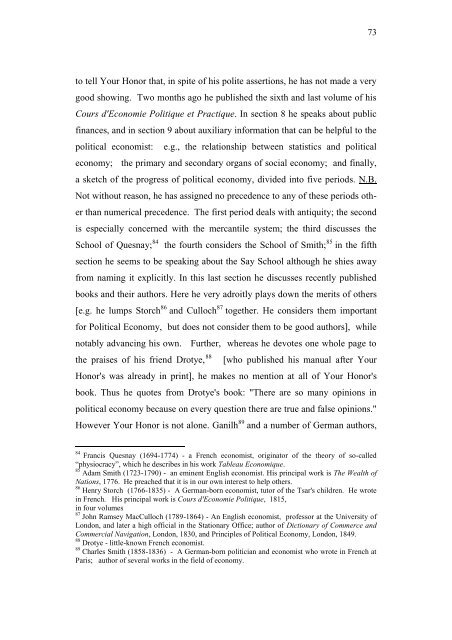

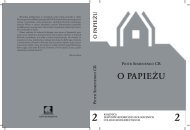
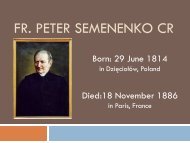
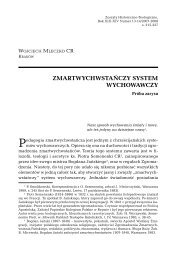
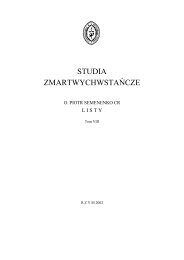
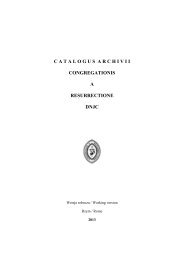
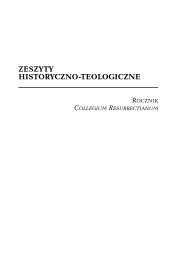
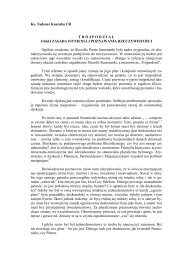
![Ks. Maciej Gawlik CR NIEZWYKÅA OSOBOWOÅÄ [w:] ks. Adolf ...](https://img.yumpu.com/52182892/1/184x260/ks-maciej-gawlik-cr-niezwykaa-osobowoaa-w-ks-adolf-.jpg?quality=85)

